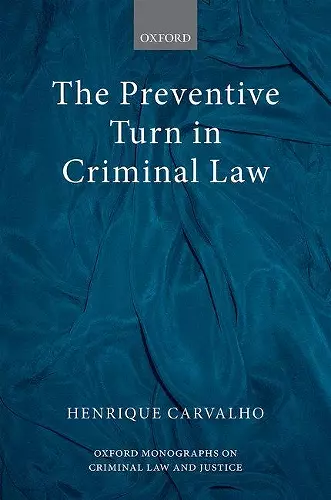The Preventive Turn in Criminal Law
Format:Hardback
Publisher:Oxford University Press
Published:27th Apr '17
Currently unavailable, and unfortunately no date known when it will be back

Shortlisted for the 2018 Hart-SLSA Theory and History Book Prize
Engaging with contemporary literature on criminal law, prevention, risk, security, and criminalisation, this volume argues that the pervasiveness of prevention in 21st century criminal justice systems represents the manifestation of essential aspects of the liberal legal and political tradition.This book presents a theoretical examination of the rise and expansion of preventive criminal offences that has gained momentum in Anglo-American criminal justice since the late-twentieth century. It shows how recent transformations in criminal law and justice are intrinsically related to and embedded in the way liberal society and liberal law have been imagined, developed and conditioned by their social, political and historical contexts. The book starts by identifying a tension, within contemporary criminal law, between the importance given to the expression of individual autonomy and responsibility, and the perceived need for prevention as a condition for the security of autonomy and the promotion of welfare. The book then traces this tension back to an intrinsic ambivalence within the modern conception of individual liberty, which is both repressed and preserved by liberal conceptions of responsibility and punishment. It finds that it is this tension that ultimately grounds the rise of preventive criminal offences in recent times. The Preventive Turn in Criminal Law engages with the main contemporary literature on criminal law, prevention, risk, security and criminalisation, by deploying a theoretical perspective from both classical and contemporary works of social and political theory, including the works of Hobbes, Locke, Hegel, and Bentham. It does so in order to reveal that the pervasiveness of prevention in twenty-first century criminal law not only represents the consequence of new and unprecedented features of contemporary politics and society, but also embeds long-established features of the liberal legal and political tradition.
The Preventive Turn in Criminal Law does a superb job of connecting political theory, criminal law theory and criminalization. In so doing, Carvalho amply demonstrates his capacity for interdisciplinary enquiry at the highest level and one can only hope that he might consider undertaking a similarly penetrating exploration of the wider import of social theory for criminal law and criminalization. It would make a splendid companion volume to this outstanding first monograph. * Lucia Zedner, Theoretical Criminology Book Symposium *
Henrique Carvalho's book makes an important contribution to the growing literature on the deployment of the substantive criminal law in an anticipatory mode. * Peter Ramsay, Theoretical Criminology Book Symposium *
Carvalho's critique of liberal criminal justice is important for two reasons. The first is that it renews the critique of criminal justice thinking as unconscious repetition. The second is that it makes a critical theory of recognition available to criminal justice scholarship, and opens a door to recent developments in psychoanalytic theory. * Alan Norrie, Theoretical Criminology Book Symposium *
This is an important and challenging interpretation of the so-called 'preventive turn' in criminal law. Carvalho argues that, far from being a development that is at odds with the logic and values of criminal law, as much academic commentary suggests, the logic of prevention is actually embedded in core concepts such as individual autonomy and responsibility. These, therefore, cannot be the bulwark against the spread of preventive offences, because, in practice, they have enabled the development of these measures. Against this Carvalho challenges us to rethink concepts such as liberty or autonomy as social concepts and to understand them in ways which do not further embed the preventive logic which lies at the heart of the modern criminal law. Overall this is an important contribution to the critical analysis of criminal law and criminal law theory. * Professor Lindsay Farmer, School of Law, University of Glasgow *
Carvalho's insight that, far from representing a radical and worrying break in the liberal tradition, the criminal law's preventive turn towards inchoate and pre-inchoate offences is in fact paradigmatic of liberalism, makes an important and provocative contribution to current debates on criminal justice. * Professor Nicola Lacey, London School of Economics *
ISBN: 9780198737858
Dimensions: 242mm x 171mm x 21mm
Weight: 496g
224 pages